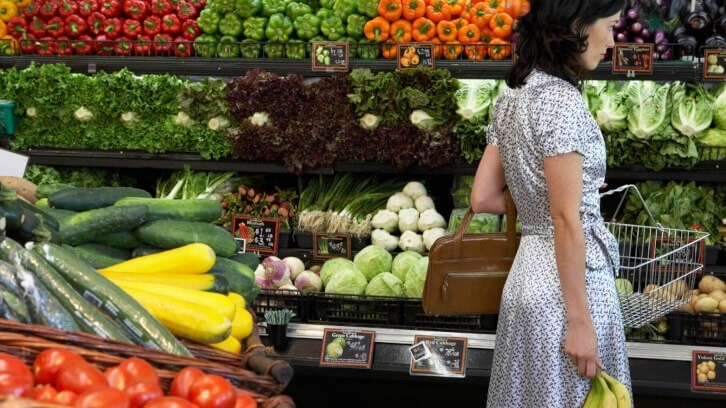Navigating pesticide use in produce: Diverse approaches from industry leaders

For its Produce without Pesticides report, Consumer Reports analyzed pesticide use in 59 common fruits and vegetables, including frozen, canned and dried formats.
The results of the study determined that pesticide use “posed significant risks in 20% of the foods … examined,” including bell peppers, celery, collard greens, blueberries, green beans, potatoes and strawberries, with a higher risk of residue from imported produce. The group recommends consuming less than half a serving a day.
Further, green beans were found to contain residues of a pesticide banned from the US over a decade ago, Consumer Reports stated.
For nearly two-third of foods, which includes “nearly all of the organic ones,” pesticide use was nominal and “presented little to worry about,” Consumer Reports stated.
The largest risks of pesticide residue stem from a small group of foods grown on a small portion of US farmland, the report noted.
“That makes it easier to identify the problems and develop targeted solutions,” James Rogers, director of food safety research and testing, Consumer Reports said in the report.
The report identified 16 out of 25 fruits and 21 out of 34 vegetables exhibiting low levels of pesticide risk, adding that children and pregnant people “can safely eat more than three servings a day of those foods.”
Ten foods, including apples, basil, cauliflower, cucumbers, peaches, pears, spinach, among others, were considered moderate risk with safe consumption up to three servings a day.
Consumer concern and industry standards
While evidence around health issues caused by pesticide use are varied, some research links pesticides to increased chance of cancer, diabetes and cardiovascular disease. Other research found that prenatal exposure to pesticides was associated with delayed intellectual development and reduced lung function in children.
However, the use of pesticides remains pertinent to growers and consumer packaged foods companies to provide resilient and affordable crops.
In April, The American Frozen Food Institute (AFFI) commented on Consumer Reports’ findings, highlighting that its member companies of produce farmers, supplies and distributors use “federally-approved pesticides” when necessary.
“We seek to minimize the use of helpful pesticides that reduce and eliminate crop damage that in-turn boosts quality and affordability and reduces food waste,” AFFI stated.
The trade group added that it relies on “widely accepted, time-tested usage and consumption safety thresholds” that are established by the US Environmental Protection Agency and supervised by USDA and FDA.
AFFI highlighted that Consumer Reports’ study did not refer to these federally established and mandated safety thresholds, adding that the study’s “researchers created their own, arbitrary risk thresholds, generating unnecessary fear for consumers.”
Indoor farms offer integrated pest management and food safety protocols without pesticide use
Indoor farms or controlled environment agriculture (CEA) promise to produce climate-resistant crops without pesticides and fertilizers while implementing technologies like robotics and AI to streamline growth and production.
While the sector’s emergence into the US produce market was off to a rocky start with past company’s failures due to high energy costs, labor challenges and product consistency, vertical farms are evolving towards profitability and consistency.
Integrating pest management practices and food safety protocols vary by a farm’s culture and operations, however, indoor farms reduce the risk of contamination found in outdoor agriculture, Aaron Fields, VP of agriculture, Eden Green Technology, told FoodNavigator-USA.
“Any CEA structure will prevent some threats compared to a traditional, field method of growing produce. Pesticide contamination happens when a toxic substance is found in elevated levels. Since indoor farming reduces the risk of pests, less pesticide usage is needed. And thus, any chance of contamination is reduced compared to traditional farming,” Fields said.
Eden Green grows leafy greens and herbs in its Cleburne, Tx. facility. In April, the company launched its herb program as a solution to driving down herb costs that are typically imported into the US.
“Indoor farms, by design, protect plants from many of the threats that exist in outdoor environments, lessening the probability of contamination and decreasing the need for harmful pesticides (e.g. the scary ones with a longer half-life, ones that accumulate on plants, or are systemically introduced into the plant, which can negatively impact surrounding wildlife and humans," Fields said.
Eden Green relies on certification from the Organic Materials Review Institute (OMRI), which reviews a company’s products against organic standards. OMRI-certified solutions serve as a solution to “deter small pests and prevent the growth of food-borne illnesses,” Eddy Badrina, CEO, Eden Green, told FoodNavigator-USA.
The indoor farm also has the benefit of growing produce hydroponically, which eliminates concern around pesticide risk and disease.
“At Eden Green, we work with all natural solutions and do not need to use harmful pesticides. Plus, one of the benefits of indoor vertical farming is we do not have soil. We grow plants hydroponically, so we do not have the same threats to worry about compared to traditional farming methods,” Fields said.
Oishii, an indoor farm company that grows specialty Japanese varietals of strawberries and tomatoes via farmers, robots and bees, is located in a 72,000 square foot Jersey City, NJ facility called Mugen Farm. The company recently expanded its production and operations with the opening of its Phillipsburg, NJ facility, Amatelas Farm, which is expected to increase output by 20 times. The indoor farm, which spans nearly 240,000 square feet, runs on renewable energy, in addition to recycling a majority of its water.
Oishii implements “highly controlled indoor farm environments,” Rita Hudetz, chief commercial officer, Oishii, told FoodNavigator-USA. This includes clean suits and “air showers” for its farmers “to mitigate any risk of introducing unwanted pests” in its farms.
Hudetz highlighted Oishii’s monitoring system that combines AI and visual recognition as additional security “to detect the presence of pests,” which would not be possible in an outdoor farm.
While indoor farming provides consumers with confidence around no risk pesticide contamination, Hudetz pointed out that pesticide risk “varies wildly from product to product,” and consumers must do their due diligence to determine how the produce was grown, emphasizing “there is even a debate among experts as to what constitutes ‘safe’ exposure levels."




















